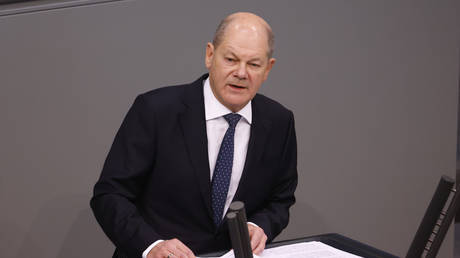ARTICLE AD BOX
Olaf Scholz has the lowest approval rating for a chancellor since the survey began in 1997
Over four in five Germans (82%) are dissatisfied with the performance of the country’s “traffic light” governing coalition, according to an ARD-DeutschlandTrend poll published on Friday.
Chancellor Olaf Scholz received the worst approval rating of any German leader since the survey was first conducted in 1997, with just 20% of respondents evaluating his work as satisfactory, and only 27% believing he can do the job at all.
Accompanying the record-setting lack of public enthusiasm, Scholz inspired confidence as a crisis manager in just 23% of respondents, while a dismal 12% found the chancellor to be a convincing communicator.
Conducted ahead of the second anniversary of the coalition’s formation out of the Social Democrats, Greens, and Free Democrats, the survey revealed levels of public discontent with the government not seen in Germany in 13 years.
Only Defense Minister Boris Pistorius was rated favorably by a slight majority of respondents, with 52% assigning him a positive rating. Foreign Minister Annalena Baerbock was rated positively by just 38%, with Minister of Economy Robert Habeck trailing still further with 30% of voters’ support. The rest of Scholz’s cabinet enjoyed even less favorable public opinion.
Read more Scholz urges support for Ukraine despite budget crisis
Scholz urges support for Ukraine despite budget crisis
The poll results revealed a marked shift in public sentiment against the government after Germany’s Constitutional Court last month declared the attempted repurposing of €60 billion ($65 billion) in unused Covid-19 funding for the Climate and Transformation Fund to be unconstitutional. The ruling sparked a budget crisis that remains unresolved as Berlin was forced to freeze most of its new spending commitments.
While over half (54%) of respondents suggested the government could help bridge the shortfall by cutting military aid to Ukraine, Scholz has vowed to continue assisting Kiev for “as long as it is necessary” due to what he described in a speech to parliament last month as the conflict’s “existential importance” for Germany and Europe as a whole. He reportedly even plans to double military aid to Ukraine next year.
Meanwhile, German soldiers reportedly continue to languish without even basic equipment and critical facility repairs at home, almost two years after Scholz promised to establish a €100 billion fund to modernize his own country’s military.
Even before the current budget crisis, a YouGov-dpa poll conducted in August found nearly three quarters of respondents viewed Scholz and his traffic-light coalition negatively. At the same time, pollster Insa found just 15% of those surveyed believed the current government to be an improvement over the previous one, with nearly half favoring the “grand coalition” under Scholz’s predecessor Angela Merkel.
.png)
 1 year ago
11
1 year ago
11








 English (US)
English (US)